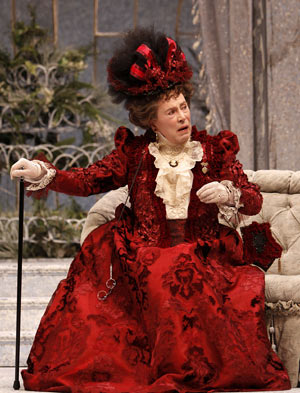So here it is at last, the distinguished thing: The Letter opens tomorrow night. The final dress rehearsal was as smooth as silk. The invited audience applauded wildly. Paul Moravec and I went home happy. Now it’s out of our hands.
If I have time, I’ll post and tweet throughout the weekend. If not…not. Meanwhile, here’s how all of us in Santa Fe are feeling today:
* * *
UPDATE: Two details from last night that I forgot to share:
• My wife doesn’t impress easily, but I finally brought off the feat by speaking the following eight words: “Hilary, I’d like you to meet Tom Ford.”
• Mrs. T gave me the perfect present after the rehearsal–a vintage Givenchy tie that was previously owned by Virgil Thomson, the great composer-critic. (She knew him at the very end of his life.) This time I was impressed.
Archives for July 24, 2009
TT: That was no lady
Life goes on, and even though I’m in Santa Fe, I filed a drama column on schedule for today’s Wall Street Journal. (I’m taking next week off.) In it I report on my visit to the Stratford Shakespeare Festival. Here’s an excerpt.
* * *
If you’re looking for one-stop theatrical shopping, go north to the Stratford Shakespeare Festival, which in summertime more or less takes over the smallish Ontario town for which it is named. This year the festival is presenting 14 plays on four stages, and the fare is richly varied. Much is being made of the fact that under Des McAnuff, the new artistic director, the festival has cut back on Shakespeare (three plays this season, five last season) and beefed up the budget for its roster of crowd-pleasing musical comedies. Be that as it may, classical theater remains Stratford’s mainstay, and Brian Bedford’s brilliantly zany staging of “The Importance of Being Earnest” is good enough to justify a trip to Canada all by itself.
 Mr. Bedford’s production of Oscar Wilde’s ever-enchanting comedy of turn-of-the-century English manners is built around a gimmick that turns out not to be the least bit gimmicky: In addition to directing, he also plays Lady Bracknell, the money-hungry monster of propriety who is determined to stop Algernon and Gwendolen (Mike Shara and Sara Topham), her nephew and daughter, from marrying beneath themselves. I don’t care for camped-up drag acts, but Mr. Bedford, who makes himself up to look like Queen Victoria and carries himself like a snooty gargoyle, is giving us something completely different, an impersonation so sharp-witted and closely observed that it demands to be accepted on its own daring terms….
Mr. Bedford’s production of Oscar Wilde’s ever-enchanting comedy of turn-of-the-century English manners is built around a gimmick that turns out not to be the least bit gimmicky: In addition to directing, he also plays Lady Bracknell, the money-hungry monster of propriety who is determined to stop Algernon and Gwendolen (Mike Shara and Sara Topham), her nephew and daughter, from marrying beneath themselves. I don’t care for camped-up drag acts, but Mr. Bedford, who makes himself up to look like Queen Victoria and carries himself like a snooty gargoyle, is giving us something completely different, an impersonation so sharp-witted and closely observed that it demands to be accepted on its own daring terms….
Martha Henry’s production of Anton Chekhov’s “Three Sisters,” by contrast, is a satisfyingly traditional, bracingly direct ensemble piece whose only novelty is the fact that it is being performed on the three-quarter-round stage of the Tom Patterson Theatre. At first I wondered whether the cast might be a bit underpowered, but then I got on Ms. Henry’s unassuming wavelength, and before I knew it I was caught up in Chekhov’s sad comedy of wasted lives. To see a classic like “Three Sisters” in so plain a setting is to appreciate anew the clear-eyed intimacy of theater in the round, and Ms. Henry uses that intimacy to maximum advantage….
* * *
Read the whole thing here.
TT: Does Broadway need women?
An enormous amount of ink is being spilled over “Opening the Curtain on Playwright Gender: An Integrated Economic Analysis of Discrimination in American Theater,” a paper by a Princeton undergraduate which purports to show, among other things, that female artistic directors of theater companies are more likely to discriminate against women playwrights than their male counterparts.
The paper, by Emily Glassberg Sands, concludes–as was already widely believed–that women playwrights get the short end of the stick in America. But is that really what the numbers crunched in “Opening the Curtain on Playwright Gender” demonstrate? I took a close and unhurried look at Sands’ facts, figures, and analysis, and my “Sightings” column in Saturday’s Wall Street Journal tells what I found there. Pick up a copy of Saturday’s paper and see what I have to say.
UPDATE: Read the whole thing here.
TT: Almanac
“I walked toward Once in a Lifetime for the last time–that final walk every playwright takes toward his play, knowing that it is no longer his, that it belongs to the actors and the audience now, that a part of himself is to be judged by strangers and that he can only watch it as a stranger himself. The main consideration of his day, the keystone that has dictated his every waking moment, the cause that has enlisted his being for all these months, is at an end. He moves toward his destination with mixed emotions–it is the completion he has sought, but there is the ache of finality in it. He is at last a spectator–a spectator with the largest stake in the gamble of the evening, but a spectator nonetheless.”
Moss Hart, Act One
